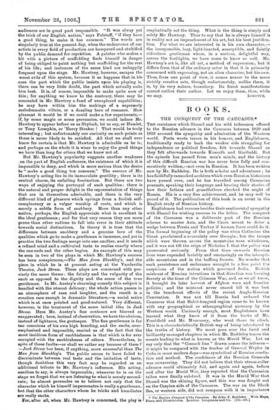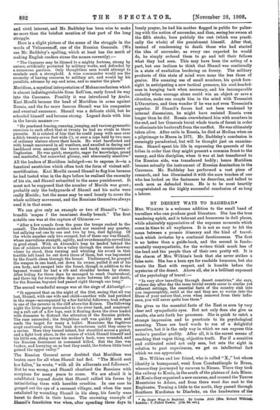BOOKS.
THE CONQUEST OF THE CAUCASUS.* . THE resistance which. Shamil and his wild tribesmen offered to the Russian advance in Alm Caucasus between 1829 and 1859 aroused the sympathy and admiration of the. Western world. Poets wrote verses in his honour, and Englishmen, traditionally ready to back the weaker side struggling for independence or political freedom, felt towards Shamil as they felt afterwards- towards Kossuth and Garibaldi. But the episode has passed from men's minds, and the history of this difficult Russian war has never been fully and con- secutively written,—not even in Russian. It has been written now by Mr. Baddeley. He is both scholar and adventurer ; lie has faithfully ransacked archives which even Russian historians have passed over, and he has travelled among Caucasian peasants, speaking their language and hearing their stories of how their fathers and grandfathers checked the might of Russia. His is a very fine achievement, and he may well be proud of it. The publication of this book is an event in the English study of Russian history.
Englishmen bad reasons besides their sentimental sympathy with Shamil for wishing success to the tribes. The conquest of the Caucasus was a deliberate part of the Russian scheme to master Asia, and the Czars meant to drive' a wedge between Persia and Turkey if human force could do it. The formal beginning of the policy was when Catherine the Great proclaimed a suzerainty over Georgia; but the troops which were thrown across the mountains were withdrawn, and it was not till the reign of Nicholas T. that the policy was prosecuted seriously. From that time onwards Russian lives were expended lavishly and unceasingly on the inhospit- able mountains and in the baffling forests. No wonder that such persistence and endurance wrought to a fine point Vie suspicions of the nation which governed India. British mistrust of Russian intentions in that direction was burning fiercely at the time of the Crimean War, and, as we all know, it brought its later harvest of Afghan wars and frontier policies ; and the mistrust never ceased till it was lost in the beneficent effects of the recent Anglo-Russian -Convention. It was not till Russia had reduced the Caucasus that that Babel-tongued region came to be known with any' geographical or ethnographical accuracy by the Western world. Curiously enough, most Englishmen have learned what they know of it from the books of Mr. Freslifield 'and Mr. Mummery, , who went there to climb. This is a•characteristically British way of being introduced to the truths of history. We must pass over the lucid and brilliantly managed chapters in which Mr. Baddeley traces the events leading to what is known as the Murid War. Let us say only that the "Cossack line" drawn :Imes the isthmus— it might be. compared with the troches of General Weyler in Cuba in more Modern days—was symbolical of Russian resolu- tion and method. The confidence of the Russian Generals was unwavering. They did not believe that their steam-roller advance could ultimately fail, and again and again, before and after the Murid Watt., they reported that the Caucasian tribes were finally subdued. It was in the Murid War that Shamil was the shining figure, and this war was fought out on the Caspian side of the Caucasus. The war on the Black Sea, or western side, did not 'compare with it in importance • The Russian Conquest 'of the Caucasus. John F. Baddeley. With Naps, Flans, and Illustrations. London: Longman' and Co. 121s. net.] and vivid interest, and Mr. Baddeley has been wise to make no more than the briefest mention of that part of the long
struggle.
Here is a slight picture of the scene of the struggle in the words of Veliameenoff, one of the Russian Generals. (We use Mr. Baddeley's spelling, which at least has the merit of making English readers stress the names correctly) :-
" The Caucasus may be likened to a mighty fortress, strong by nature, artificially protected by military works, and defended by a numerous garrison. Only thoughtless men would attempt to escalade such a stronghold. A wise commander would see the necessity of having recourse to military art, and would lay his parallels, advance by sap and mine, and so master the place."
Muridism, a mystical interpretation of Mohammedanism which is almost indistinguishable from Sufi'ism, early found its way into the Caucasus. Possibly it was introduced by Arabs. Kazi Moullii, became the head of Muridism in arms against Russia, and the far more famous Shamil was his companion and eventual successor. Shamil was a delicate child, but he schooled himself and became strong. Legend deals with him in the heroic manner :— " He practised fencing, running, jumping, and various gymnastic exercises to such effect that at twenty he had no rivals in these pursuits. It is related of him that ho could jump with ease over a ditch twenty-seven feet wide (!), or over a rope held by two men of ordinary stature above their heads. He went barefooted and with breast uncovered in all weathers, and excelled in daring and hardihood even amongst the brave and hardy mountaineers of Daghestan. He was quick, energetic, eager for knowledge, proud and masterful, but somewhat gloomy, and abnormally sensitive."
AU the leaders of Muridism indulged—so to express it—in a fanatical asceticism which often took the form of violent self- mortification. Kazi Moullii caused Shamil to flog him because he had tasted wine in the days before he realised the enormity of his sin, and Shamil submitted to the same punishment. It must not be supposed that the number of Murids was great ; probably only the bodyguards of Shamil and his naibs were really Murids ; but the name may be used loosely to cover the whole military movement, and the Russians themselves always used it in that sense.
We can give only an example or two of Shamil's "hair- breadth 'scapes i the imminent deadly breach." The first notable one was at the capture of Ghimree "After a few rounds from the guns the troops rushed to the assault. The defenders neither asked nor received any quarter, but sallying out one by one and two by two, died fighting. Of the whole number only two escaped, but of these one was Shamil, whose marvellous strength, agility, and swordsmanship served him in good stead. With an Alvarado's leap he landed behind the line of soldiers about to fire a volley through the raised doorway where ho stood, then turning and whirling his sword in that terrible left hand he cut down throe of them, but was bayoneted by the fourth clean through the breast. Undismayed, he grasped the weapon in one hand, cut down its owner, pulled it out of his own body, and escaped into the forest, though in addition to the bayonet wound he had a rib and shoulder broken by stones. After hiding for three days he managed to reach Ountsoukoul, and there lay for twenty-five days more between life and death, for the Russian bayonet had passed right through one lung."
The second wonderful escape was at the siege of Akhoulg6
"It appeared that on the night of the 21st, seeing that all was lost, Shamil, with one wife and child—another wife had perished in the siege—accompanied by a few faithful followers, took refuge in one of the caverns in the cliff above the Koisou. The following night the little party descended to the river bank, and construct- ing a raft out of a few logs, sent it floating down the river loaded with dummies to distract the attention of the Russian pickets. The ruse succeeded ; the freightless raft was quickly seen and made the target for many a bullet. Meantime the fugitives crept cautiously along the bank downstream until they came to a ravine. Here they turned inland, but stumbled across a picket, and a fight took place, in the course of which Shamil himself and his little son, slung across his mother's back, were wounded, and the Russian lieutenant in command killed. But the line was broken, and hurrying on as best they could, the forlorn little band gained the upper valley."
The Russian General never doubted that Muridism was beaten once for all when Shamil had fled. " The Murid sect has fallen," he wrote, " with all its adherents and followers." But he was wrong, and Shamil chastised the Russians with scorpions for many years to come. We are afraid it is established beyond doubt that Shamil rallied his forces by intimidating them with horrible cruelties. In one case he gouged out the eye of a recusant villager, and when the man retaliated by wounding Shamil in his sleep, his family were burnt to death in their house. The crowning example of Shamil's fanaticism was when, after spending three days in lonely prayer, he had his mother flogged in public for palter- ing with the notion of surrender, and then, seeing her swoon at the fifth stroke, bore publicly the rest (which was practi- cally the whole) of the punishment himself. After that, instead of condemning to death those who had started the idea of surrender, as every one expected he would do, he simply ordered them to go and tell their fellows what they bad seen. This may have been the acting of a part, but one inclines to think that Shamil was continually in a state of exaltation bordering on frenzy. The military products of this state of mind were none the less those of genius. His amazing use of small numbers, his quick fore- sight in anticipating a new tactical pressure, his cool-headed- ness in hanging back when necessary, and his incomparable audacity when courage alone could win an object or save a situation, make one couple him in the mind with Toussaint L'Ouverture, and then wonder if be was not even Toussaint's superior. If Shamil's forces had not been weakened by internal dissensions, he might have resisted Russia even longer than he did. Russia overwhelmed him with numbers in the end, and her Generals burnt whole tracts of forest in order to eliminate his bushcraft from the conflict. He was ultimately taken alive. After exile in Russia, be died at Medina when on a pilgrimage to Mecoa in 1871. Mr. Baddeley's conclusion is seemingly paradoxical, but will be thought just on examina- tion. Shamil spent his life in repressing the quarrels of the tribes in order that they might present a common front to the enemy, and this discipline, when it was at last transferred to the Russian side, was transferred bodily ; hence Muridism became actually the instrument of Russian domination in the Caucasus. Mr. Baddeley has performed a vast piece of research, and has illuminated it with the sure touches of one who has looked on the fastnesses be describes, and talked to such men as defended them. He is to be most heartily congratulated on the highly successful conclusion of so long a labour.



















































 Previous page
Previous page